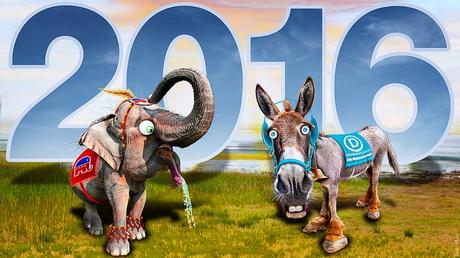 (This caricature of Republican and Democratic symbols is by DonkeyHotey.)
(This caricature of Republican and Democratic symbols is by DonkeyHotey.)Candidates are now starting to officially toss their hats into the ring for their party's nomination, and like it or not, the race for president in the 2016 election has officially started. But I have noticed something that seems to be very big on social media right now -- a number of people are saying there is no difference between the two parties. They say both have sold out to Wall Street, and don't care about the common man anymore.
I do believe that the Republicans long ago sold out to the monied interests (which is why they instituted "trickle-down" economics). And sadly, far too many Democratic politicians are also being wooed by the huge donations Wall Street and the corporations offer. But this does not mean there is no difference between the two parties. There is a huge difference between the two major parties, and a huge difference in the policies that would be pursued by the candidates of those parties if elected as president.
Here is how Nobel Prize-winning economist Paul Krugman puts it in his New York Times column:
So Hillary Clinton is officially running, to nobody’s surprise. And you know what’s coming: endless attempts to psychoanalyze the candidate, endless attempts to read significance into what she says or doesn’t say about President Obama, endless thumb-sucking about her “positioning” on this or that issue.
Please pay no attention. Personality-based political analysis is always a dubious venture — in my experience, pundits are terrible judges of character. Those old enough to remember the 2000 election may also remember how we were assured that George W. Bush was a nice, affable fellow who would pursue moderate, bipartisan policies.
In any case, there has never been a time in American history when the alleged personal traits of candidates mattered less. As we head into 2016, each party is quite unified on major policy issues — and these unified positions are very far from each other. The huge, substantive gulf between the parties will be reflected in the policy positions of whomever they nominate, and will almost surely be reflected in the actual policies adopted by whoever wins.
For example, any Democrat would, if elected, seek to maintain the basic U.S. social insurance programs — Social Security, Medicare, and Medicaid — in essentially their current form, while also preserving and extending the Affordable Care Act. Any Republican would seek to destroy Obamacare, make deep cuts in Medicaid, and probably try to convert Medicare into a voucher system
Any Democrat would retain the tax hikes on high-income Americans that went into effect in 2013, and possibly seek more. Any Republican would try to cut taxes on the wealthy — House Republicans plan to vote next week to repeal the estate tax — while slashing programs that aid low-income families.
Any Democrat would try to preserve the 2010 financial reform, which has recently been looking much more effective than critics suggested. Any Republican would seek to roll it back, eliminating both consumer protection and the extra regulation applied to large, “systemically important” financial institutions.
And any Democrat would try to move forward on climate policy, through executive action if necessary, while any Republican — whether or not he is an outright climate-science denialist — would block efforts to limit greenhouse gas emissions.
How did the parties get this far apart? Political scientists suggest that it has a lot to do with income inequality. As the wealthy grow richer compared with everyone else, their policy preferences have moved to the right — and they have pulled the Republican Party ever further in their direction. Meanwhile, the influence of big money on Democrats has at least eroded a bit, now that Wall Street, furious over regulations and modest tax hikes, has deserted the party en masse. The result is a level of political polarization not seen since the Civil War.
Now, some people won’t want to acknowledge that the choices in the 2016 election are as stark as I’ve asserted. Political commentators who specialize in covering personalities rather than issues will balk at the assertion that their alleged area of expertise matters not at all. Self-proclaimed centrists will look for a middle ground that doesn’t actually exist. And as a result, we’ll hear many assertions that the candidates don’t really mean what they say. There will, however, be an asymmetry in the way this supposed gap between rhetoric and real views is presented.
On one side, suppose that Ms. Clinton is indeed the Democratic nominee. If so, you can be sure that she’ll be accused, early and often, of insincerity, of not being the populist progressive she claims to be.
On the other side, suppose that the Republican nominee is a supposed moderate like Jeb Bush or Marco Rubio. In either case we’d be sure to hear many assertions from political pundits that the candidate doesn’t believe a lot of what he says. But in their cases this alleged insincerity would be presented as a virtue, not a vice — sure, Mr. Bush is saying crazy things about health care and climate change, but he doesn’t really mean it, and he’d be reasonable once in office. Just like his brother.
As you can probably tell, I’m dreading the next 18 months, which will be full of sound bites and fury, signifying nothing. O.K., I guess we might learn a few things — Where will Ms. Clinton come out on trade agreements like the Trans-Pacific Partnership? How much influence will Republican Fed-bashers exert? — but the differences between the parties are so clear and dramatic that it’s hard to see how anyone who has been paying attention could be undecided even now, or be induced to change his or her mind between now and the election.
One thing is for sure: American voters will be getting a real choice. May the best party win.

